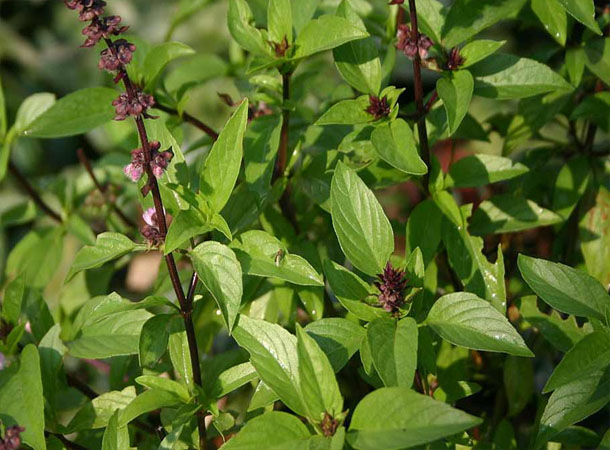1. It cure Fever: Tulsi has very potent germicidal, fungicidal, anti-bacterial and anti-biotic properties that are great for resolving fevers. It has the potential to cure any fever right from those caused due to common infections to those caused due to malaria as well. In ayurveda, it is strongly advised that a person suffering from fever should have a decoction made of tulsi leaves. In case of a fever boil a few leaves of tulsi with powdered cardamom in half a litre of water (The proportion of tulsi to cardamom powder should be in the ratio 1:0.3). Let it reduce to half its total volume. Mix this decoction with sugar and milk. Sip every two to three hours. This remedy is especially good for children.
2. It beats diabetes: Leaves of holy basil are packed with antioxidants and essential oils that produce eugenol, methyl eugenol and caryophyllene. Collectively these substances help the pancreatic beta cells (cells that store and release insulin) function properly. This in turn helps increase sensitivity to insulin. Lowering one’s blood sugar and treating diabetes effectively. An added advantage is that the antioxidantspresent in the leaves help beat the ill effects of oxidative stress
3. It protects the heart: Tulsi has a powerful anti-oxidant component called Eugenol. This compound helps protect the heart by keeping one’s blood pressure under control and lowering his/her Cholesterol levels. Chewing a few leaves of tulsion an empty stomach everyday can both prevent and protect any heart ailments.
4. It beats stress :According to a study conducted by the Central Drug Research Institute, Lucknow, India, tulsi helps to maintain the normal levels of the stress hormone – cortisol in the body. The leaf also has powerful adaptogen properties (also known as anti-stress agents). It helps sooth the nerves, regulates blood circulation and beats free radicals that are produced during an episode of stress. People who have high stress jobs can chew about 12 leaves of tulsitwice a day to beat stress naturally.
5. It dissolves Kidney stones:The holy basil being a great diuretic and detoxifier is great for the kidneys.Tulsi helps reduce the uric acid levels in the blood, helps cleanse the kidneys, the presence of acetic acid and other components in its essential oils helps in breaking down kidney stones and its painkiller effect helps dull down the pain of kidney stones. To relieve kidney stones one must have the juice of tulsi leaves with honey, every day for six months to help wash out the stone from the kidney. Read more about causes, symptoms, diagnosis and treatment of Kidney stones.
6. It beats cancer: With strong anti-oxidant and anti-carcinogenic properties tulsi has been found to help stop the progression of Brest cancer and oral cancer (caused due to chewing tobacco). This is because its compounds restrict the flow of blood to the tumour by attacking the blood vessels supplying it. Have the extract of tulsievery day to keep these conditions at bay. Read more about causes, symptoms, diagnosis and treatment of Brest cancer.
7. It helps to quit smoking: Tulsi is known to have very strong anti- stress compounds and is great to help one quit smoking. It helps by lowering the stress that may be involved in trying to quit smoking, or stress that leads to the urge to smoke. It also has a cooling effect on the throat just like menthol drops and helps control the urge to smoke by allowing the person to chew on something. Ayurveda relies heavily on tulsi leaves as a smoking cessation device. Keep some leaves with you and chew it whenever the urge to smoke arises. Another plus is that the antioxidant property of the leaves will help fight all the damage that arises out of years of smoking.
8. It keeps your skin and hair healthy and glowing: The holy basil has powerful purifying properties. When eaten raw, it purifies the blood giving the skin a beautiful glow, and prevents the appearance ofacne and blemishes. Its anti-bacterial and anti-fungal properties are very effective in preventing breakouts on acne prone skin. Ayurvedic doctors say that this herb can cure difficult skin conditions like those caused due to ring worms and even leucoderma. Apart from all this, it helps in reducing itchiness of the scalp and helps to reduce hair fall. Mix the powder in coconut oil and apply regularly to the scalp to prevent hair fall. Eatingtuls leaves, drinking the juice, or adding its paste to a face pack can help cure skin and hair conditions.
9. It heals respiratory conditions: Tulsi has immunomodulatory (helps to modulate the immune system), antitussive (suppresses the cough center, reducing the amount of cough) and expectorant properties (helps expel phlegm from the chest), that make it a great relief forcouhs, cold and other respiratory disorders including chronic and acute bronchitis. Another great property of this leaf is that it has anti-bacterial and anti-fungal properties that help to beat the infection causing the respiratory problem. It also relieves congestion since it contains potent components like camphene, eugenol and cineole in its essential oils. Its anti-allergic and anti-inflammatory properties also help to treat allergic respiratory disorders.
10. It cures a headache: Tulsi helps to relieve headaches caused due to sinusitis, allergies, cold or even migraines. This is because it has pain relieving and decongestant properties, that help relieve the pain and resolve the root cause of the condition. If you are suffering from a headache, make a bowl of water that has been boiled with crushed tulsi leaves or tulsi extract. Cool the water till it is room temperature or bearably hot. Place a small towel in it, wring out the excess water and place this on your forehead to treat a headache. Alternatively you could dip a towel in plain warm water and add a few drops of tulsi extract to the towel for immediate relief.








